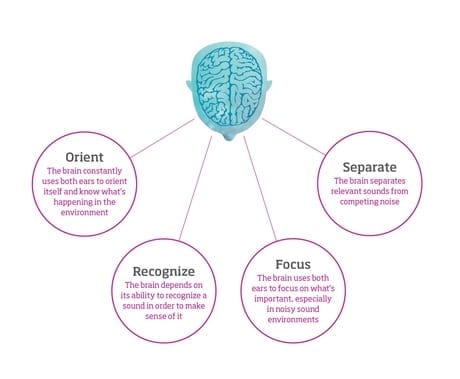Detect sound with your ears – Hear with your brain
We hear with our ears right?
That’s how we’ve always considered it. But when we think about hearing, we really mean how we use the sounds we collect from our ears. You actually hear with your brain.
The brain has many complex hearing functions, including filtering the sound coming from our ears so we can focus on what is important and matching sounds we hear to what is already familiar to us.
Often we do not notice familiar sounds because our subconscious brain accepts them as normal. We do notice new sounds and words that are important to us. They jump into our consciousness. For example, we are more likely to notice if someone says our name.
When you first get hearing aids you will hear a lot of new sounds. At the beginning everything will sound new and different. It takes time for the brain to locate, identify and then normalise sounds that have not been detectable for a while. It takes time to adapt and be able to hear with your brain again.
Hearing aids help your brain to hear
Hearing aids are small computers that often work together as a team, to optimise the signal received by the brain. They are constantly measuring the sound environment and adjusting the way they amplify to optimise hearing comfort and speech understanding and to reduce listening effort. They usually amplify quiet sounds more than loud sounds and very loud sounds pass through the hearing aid and are not amplified at all.
Higher level hearing aids have more automatic features to modify the sound to help you hear clearer and with less effort, especially in difficult listening environments.
Detect sound with your ears
Our ears are designed to collect sound from the environment, amplify and change it into a signal that can be delivered, via nerves, to the hearing centre in our brain (auditory cortex).
The brain identifies the signal and recognises it as sound from the environment or to understand speech.
Hearing loss usually means the ears are damaged or impaired in some way. For most hearing loss we loose the ability to detect the quieter sounds but louder sounds are not affected, or only effected slightly.
In most cases, just increasing the volume of the sound to our ears is not helpful to improve hearing clarity. In some cases loud sound can cause distortion in our hearing system which reduces our hearing clarity.
Hear with your brain

Your brain uses the signals collected from your ears to ORIENT you by localising which direction the sound is coming from and to RECOGNISE familiar sounds, voices and words. Next the brain will FOCUS the important sounds like speech or music and SEPARATE out unwanted sounds or noise. These fours tasks occur simultaneously and consistently while you are awake. From Oticon – Brain Hearing
Use it or loose it
Wearing hearing aids more strengthens the auditory system by giving it more practice and helping it learn which sounds are important and which sounds are not.
The ability to understand speech, especially in noisy environments often improves with increased wearing time.
Regular hearing aid use will help your brain “hear better”
Interpreting sound information requires regular exposure. People who wear their hearing aids “only sometimes” are giving their brain two signals, hearing and not hearing, some sounds.
Their brain does not have as much practice interpreting the sound information and will not be able to use the information so well.
The ability to discriminate words reduces over time – especially with significant hearing loss
When there is hearing loss, the brain is not receiving a regular signal. As this continues for many years the brain does not have as much practice using this information and becomes less capable of using the sound information. It is possible that the brain may even reallocate those brain resources to another function.
The sooner you get hearing aids, the sooner you are providing your auditory system with sound and keeping it active and functioning as optimally as possible.
“I notice people ability to repeat back single words, in quiet, improves with regular hearing aid use. This effect is strongest for people with more severe hearing losses.”
Maree O’Sullivan (Audiologist)
New hearing aids – Get ready for your hearing adventure
Hearing aids do not act like a volume control. Everything will not just sound louder, like when you turn up the TV. Hearing aids are programmed specifically to improve your hearing. They are set up and programmed to compensate for your specific hearing loss. They usually amplify quieter sounds more and louder sounds less, or not at all. You will pick up sounds you had forgotten about as you have been unable to detect them for years.
The sound level and the way hearing aids amplify is constantly changing depending on the listening environment that you are in. They detect the environment and optimise the sound directed to your ears, which helps your brain use the sound information.
It is important we match the right level of technology to your listening needs. Well fitted hearing aids will help you to confidently hear what is said the first time. This means you will not need to keep doing mental calculations to work out what they could have said and no need to ask for repeats.
Most hearing aids will work well in easy listening environments. Higher end hearing aids are able to modify the sound in more detail often giving better sound quality and reduced listening effort for the wearer. Higher end hearing aids give better results in difficult listening environments like noisy and echoey rooms.
Are you ready for your own hearing adventure?
Are you are at the point where you are ready to do something to help your hearing? You are welcome to make an appointment for a hearing assessment and hearing aid consultation. During the appointment we will program some hearing aids up especially for your hearing levels and let you experience the new and clearer sound.
If there is time you can even go next door to the cafe for a coffee so you can see what is is like to hear clearly even in noise.


